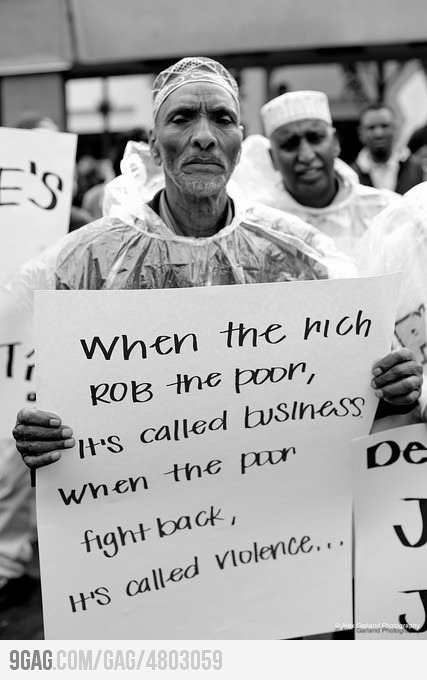Injustice is a violation of the rights of another and is a behavior that is unsatisfactory and unfortunately perpetuated by all people. It has been a recurring issue in all societies and cultures. Individuals have failed to realize that they are writers, actors, and even directors in the production of injustice. The individual’s responsibility is to enforce change, starting with himself, in order to prompt others to follow and break the cycle of injustice. In the novels Invisible Man, by Ralph Ellison and Fahrenheit 451, by Ray Bradbury, the narrator and protagonists are victims of racism and oppression. The way they react to their injustice differs. Although individuals believe their responsibility is to gather support from others using rhetorical devices, such as ethos pathos and logos, they must first become their own moral compass, which is the embedded power in all people to enforce change, by developing self-confidence, self-reliance, and making necessary changes to himself.
The narrator was the victim of a form of injustice known as racism, and he was not even aware of it. The moral compasses, in which he followed, the white men who held power, were the ones victimizing him instead of praising him as he wanted to believe. In his college years, the narrator has very little confidence in himself and background. “Most of us knew in our home towns and of whom we were deeply ashamed,” (pg. 111). Although he was a smart boy, he was from an impoverished family, and before his grandfather died, he spoke rancorously of his son and himself, saying they were traitors to their people. He said this because he was a puppet for the white men, and he did not respect himself or fight for the integrity of black people. He could not become a moral compass because he had no confidence in himself and did not think positively of himself. Furthermore, the individual must develop self-reliance. Without self- reliance, no individual can carry on with their lives. The narrator was over reliant on the rich white men in his community to nurture him. He expected them to pay for his education and everything in his life. Although the narrator was badly beaten in the events that occurred before he received the scholarship, which most black people did not receive, he was overjoyed when he was given the opportunity to recite his speech in front of the most prominent white men in his town. He was only concerned with pleasing the rich white men and having his education funded because he did not mind being beaten by Tatlock, a boy of a much larger caliber than him, and also being bamboozled with fake tokens he thought was money. “It was a scholarship to the state college for Negroes. I did not even mind when I discovered that the gold pieces I had scrambled for were brass pocket tokens advertising a certain make of automobile.” (pg. 32) The narrator cannot imagine his life without the support of a white man, and he only used his intelligence and skills to impress the white men, in order for them to like him. This truly hurt him in his future, as he continued to be an over-reliant slave to the white man and his ideals. He became a victim of injustice because his right had been violated, and his liberation was deprived.
Lastly, the individual must make changes to themselves in order to resolve injustice. This is important because they must change their mentality about injustice in order to overcome it. The father of Indian independence, Mahatmas Gandhi once said, “Be the change you wish to see in the world”. This explains that an individual has to change himself, before he can see a change in his surroundings. In the novel Fahrenheit 451 by Ray Bradbury, the protagonist Guy Montag is unaware that he is oppressed, or even that he is an oppressive force. He burned books, which in a normal society would be a crime. After meeting a character foil, Clarisse McClellan, he became aware of his actions, and antagonist, Captain Beatty. “He burnt the bedroom walls and the cosmetics chest because he wanted to change everything.” (pg. 116) This passage is a metaphor; all the things the narrator wants to burn and change are a reflection of himself. He wanted to burn away everything old and evil about himself, to become a moral compass that could enforce justice.
In conclusion, when fighting against injustice, individuals use the strategy to fight as a large group. Even though this is a good tactic to use, it may also be weak without the proper tools. A strong support group can only come from a strong moral compass, someone who realizes that they are empowered to enforce change. Individuals fail to realize that the change starts with them, like Civil Rights activist Malcolm X, he realized that his responsibility was to change himself in order to stop injustice in America. He said “If you stand for nothing, you will fall for anything”. In the novels Fahrenheit 451, by Ray Bradbury and Invisible Man, by Ralph Ellison, one individual became a moral compass by making changes to themselves, while the other used his “invisibility” to create more injustice . A strong moral compass is someone who has developed self-confidence, self-reliance and he has made the necessary changes to himself in order to change his society. Do modern day individuals have what it takes to become a strong moral compass?





